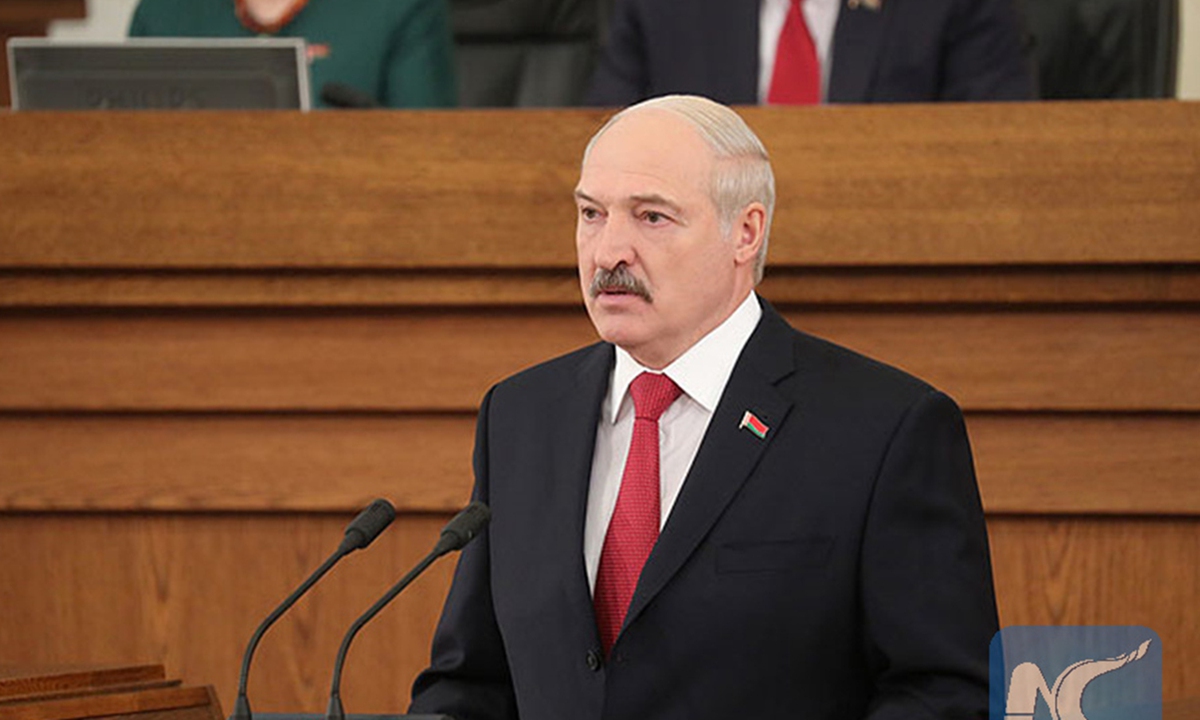Minsk confronts domestic, geopolitical challenges: Global Times editorial
Source: Global Times Published: 2020/8/24 22:28:40

Belarusian President Alexander Lukashenko Photo: Xinhua
Belarusian President Alexander Lukashenko is confronting the most severe challenge in his 26 years in power. The opposition forces, which accused him of winning the presidential election through fraud, have won the support of at least part of the public in Belarus' capital Minsk. The anti-government demonstrations have reached a scale that could impact the country's stability.
Lukashenko flew over the demonstrators and arrived at his Minsk residence in a helicopter on Sunday, wearing body armor while holding a rifle. Such images reinforced the people's impression of tensions in Belarus.
Lukashenko was elected to his sixth term as president two weeks ago with 80.23 percent of the vote. The result was immediately questioned and boycotted by the opposition, and Belarus soon fell into turbulence that has never been seen since he came to power.
The similar incident, the opposition refusing to accept its defeat after election, was once staged in Ukraine, a country next to Belarus, which evolved into a "color revolution." Where is the situation in Belarus headed? This has attracted the attention of neighboring countries, as well as major powers.
Western countries hope that the Belarusian opposition could overthrow Lukashenko this time. The US has been imposing sanctions on Belarus, because apart from their ideological antagonism, Minsk and Moscow are allies. For Western forces, including the US, pulling Lukashenko down would deal a blow to Russia.
Belarus is Russia's last shield. Eighty percent of the Belarus' population is Russian Orthodox. Unlike Ukraine, where most are Catholics, Russia's influence can be better maintained in Belarus to resist Western subversion.
The chaos in Belarus was caused by complicated internal and external factors. In the end, it seems to be marked by major power games, which have almost become a template for sensitive affairs in Central and Eastern Europe.
European history shows that once a small country becomes the focus of major power wrestling, if its opinions at home are severely divided, the country would usually turn into a tragedy. Ukraine, Bosnia and Herzegovina are typical examples.
Belarus and Russia have long historical ties with close connections in their language and culture. After the dissolution of the Soviet Union, the two formed the Union State in 1997. Belarus' political track was once clear. But after former Warsaw Treaty members and all three Baltic countries joined NATO, Belarus had become a new frontline of major power games. When the West, led by the US, squeezes Russia's strategic space, the focus shifts to Belarus.
If Belarus cannot reach compromises on domestic political issues, resolve the crisis on its own, and if political divisions further intensity, Belarus will most likely become a battlefield between the West and Russia.
Assuming the pro-Russia stance cannot dominate the country, a pro-West stand is less likely to be solidified there. It will be difficult to make the vast majority of Belarusians hate Russia in a long term, and help the West squeeze Russia.
The situation in Belarus shows the Western value system is still attractive, which could penetrate into non-Western societies, and it is hard for small countries to resist it.
It is very difficult for non-Western countries to explore a development path independently, because Western public opinion does not support such explorations, and would increase domestic political disputes in those countries. Such exploration is also far from forming a trend and can often be argued as sailing against the tide.
Ukraine is the most comparable country to Belarus among former Soviet Union members. Both were relatively developed republics at the time, and Ukraine was even stronger than Belarus. Ukraine is one of the first countries in the Commonwealth of Independent States to have undergone a color revolution. Now, it's per capita GDP is only about half of Belarus'.
This means no matter which path countries like Belarus and Ukraine take, it would be hard for them to march forward. They have not yet completely escaped from the aftereffects of the disintegration of the Soviet Union.
Posted in: EDITORIAL